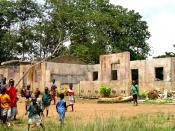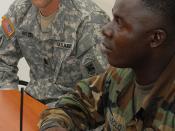Introduction
During conflicts, military forces are habituated in committing egregious human rights violations, likewise are the ruthless paramilitary bodies that fall outside the chain of command. Also, the judicial system and the principle of rule of law are either routinely sidestepped, or abused along ethno-political contours. In short, the entire system of government is skewed towards the rationale of war. Hence, the need to reform these agencies that deal with security, which collectively form the 'security sector' becomes pertinent for the success of post-conflict peace-building.
The wartime human and material destruction imposes needs for massive technical assistance and socioeconomic resources vital to a successful post-war transformation to peace. The security sector, given its centrality, as often the case, to the outbreak of conflicts and the criminal damage and heinous human rights violation that it brings, thus become a significant component of post-conflict peace-building. The current reality of international (external) resources for post-conflict transformation is hardly new, not least by the reparations paid by Germany (as a form of external resources) to the Allies in the Treaty of Versailles after World War One and the Marshall Aid to countries in Western Europe after World War II.
The Cold War period continued this tradition with security sector assistance being dominated by the United States of America (USA) and the Union of Soviet Socialist Republics (USSR). The unexpected failure to realize the much anticipated peace dividend in the post-Cold War era has led, not only to the broader redefinition of security, but also to the emergence of initiatives, such as security sector reform (SSR), designed to create a benign security apparatus. This was clearly illuminated by the erstwhile Secretary General of the United Nations, Boutros Boutros-Ghali in his 1992 'Agenda for Peace'. Among other things, he set forth the scope of post-conflict peace-building...


